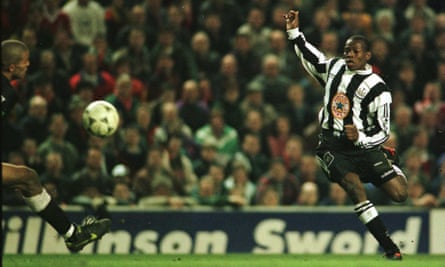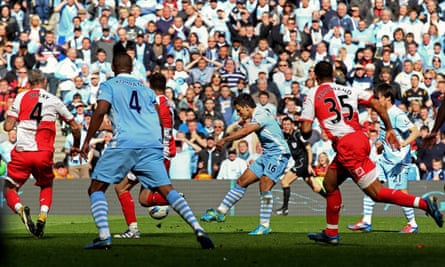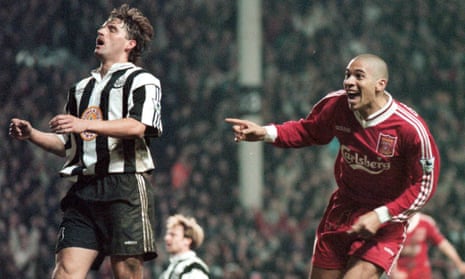History is not always written by the winners. Manchester United were unquestionably the best team in the land in 1996; they proved it by landing the league and Cup Double. The triumphant return of Eric Cantona, the flowering of the Class of ’92, you can’t win anything with kids, all that … there is plenty to go on. And yet this particular story is not theirs to tell.
Occasionally the narrative is dominated by those who fell short – and that year there was clearly something in the air. Germany emerged triumphant at the European Championship, a tournament principally remembered for England’s dreaming, their 30th year of hurt. In golf the green jacket was draped around Nick Faldo’s shoulders at the Masters, the great man’s third win, an achievement back then bettered only by Jack and Arnie, though all everyone has talked about ever since is Greg Norman’s view-through-fingers collapse. And as for the Premiership …
On the morning of Wednesday 3 April Manchester United sat atop the table. They had long established themselves as England’s dominant force. Were it not for the West Ham United keeper Ludo Miklosko’s absurd Peter Schmeichel tribute act on the final day of the 1994-95 campaign, memorably denying a disbelieving Andy Cole during an all-angles second-half bombardment, they would have won three titles in a row. As it was, Blackburn Rovers became champions of England instead, for the first time since 1914.
That clearly encouraged Newcastle United. They had not won the league since 1927 but were upwardly mobile under Kevin Keegan, who had rescued a moribund team from relegation to the third tier in 1992, then won promotion in quick order, in sparkling style. Newcastle continued to entertain on their return to the top flight, finishing third then sixth, and by the start of 1995-96, with the in-form Les Ferdinand, wily Peter Beardsley and sexy David Ginola in lockstep up front, looked ready to follow the Rovers’ return by stepping out of the long sepia shadows.
On the eve of the campaign the legendary Guardian football expert David Lacey predicted that Newcastle – “the most watchable side in the Premiership” – would emerge as champions. “Surely their time has come.” Well, yes, it is easy in hindsight. But look what Lacey wrote in the very next paragraph: “There is still something slightly manic about what is happening at St James’ Park. If Newcastle jump the points, the crash will be spectacular.” Not bad, huh? As caveats go, that is a super saver.
So it came to pass. Keegan’s side went off like a train, winning 11 and drawing one of their first 13 league matches. By the middle of January, when Paul Kitson and Beardsley saw off Bolton Wanderers at home, Newcastle had established a 12-point lead over Liverpool and Manchester United at the top. All three sides had 15 games left; it looked all over bar a chorus of ah-me-lads.
Not that Keegan was taking any chances. He wanted to strengthen his squad with “at least one new player by our next game”, mulling over a move for Bayern Munich’s Jean-Pierre Papin. Instead he plumped for Faustino Asprilla, who in early February jetted into Teesside Airport four hours before a match at Middlesbrough, downed a large tumbler of white wine, then came off the bench for a brief cameo that turned likely defeat into a 2-1 victory. “In 11 minutes he arguably confirmed Newcastle as champions,” this paper reported. “His team-mates visibly grew in his presence, their belief and ability reaffirmed.” Newcastle held a nine-point lead over Manchester United, with a game in hand.
Tino would eventually be left holding the thread that was about to unravel. But in truth the signs that something was not quite right had been there long before his arrival. A ragged 3-3 draw at Wimbledon before Christmas suggested Newcastle might not be totally title-proof. Defeats at Chelsea and Manchester United quickly followed, though a four-game winning burst, culminating in Asprilla’s debut spree at Boro, appeared to have steadied the ship.

Appearances can be deceptive, just as received wisdom can be wide of the mark. The new man’s first start coincided with defeat at West Ham, a match in which the Colombian hit the post. He then scored in an overheated 3-3 draw at Manchester City, elbowing Keith Curle and later planting the nut on the same player. Ooyah, oof. “He’s from Latin America, that’s the way they are,” Keegan shrugged.
In an impressive win in a quick return against West Ham Asprilla scored his first goal in front of the Gallowgate End and set up another. Then he created three first-half chances for Ferdinand and another for Beardsley in a laughably lopsided first-half onslaught against Manchester United – but all were squandered, allowing Cantona to plunder a smash-and-grab winner that ended Newcastle’s run of 13 successive home wins. Next, he hit the woodwork again in another defeat, this time at Arsenal.
Asprilla may have had his faults, and the consequences of his integration are a matter for conjecture, but things should be kept in perspective. Either way Manchester United had kept on winning, eating into Newcastle’s healthy lead and then taking over at the top. Liverpool, threatening to re-emerge from their five-season funk, had been in form as well, hauling themselves to the fringes of the title race. So when Newcastle travelled to Anfield in early April, three points behind the new leaders but with two games in hand and facing a team with an outside chance of glory themselves, the climate was just so for a perfect storm. Newcastle were dreaming of ending a 69-year drought; Liverpool’s six-year itch seemed, to them at least, almost as long, given the scale of their dominance during the 70s and 80s. Context was everything and desperation makes people do the funniest things.
Arithmetically, Newcastle did not have to win – but momentum dictated otherwise. Especially when they fell behind after 97 seconds, Robbie Fowler nodding home Stan Collymore’s peachy cross from close range. By the quarter-hour Newcastle were in front – Neil Ruddock made to look foolish by Asprilla, who set up Ferdinand, Ginola stroking home their second.
On 55 minutes Steve McManaman ambled down the right and slipped a pass inside for his pal Fowler, who at this point in his career, still not 21, looked as if he was capable of anything and everything. He rammed home an equaliser from the edge of the box. Less than two minutes later Asprilla was sprung clear down the inside right by Rob Lee and sprayed a preposterous curler around a stranded David James from 25 yards and into the net. Instinctive, astonishing, bow-legged brilliance.
Ten more minutes passed before Jason McAteer barrelled down the right and rolled a gorgeous ball along the corridor of uncertainty, teeing up Collymore to force the ball home at the far post. Both teams ping-ponged in search of a winner, which eventually came in injury time when John Barnes and Ian Rush threatened to confuse each other on the edge of the Newcastle area, Barnes taking charge by stroking the ball left for Collymore, Liverpool’s record £8.5m signing stroking home to settle a match of rhythmic, aesthetic – all the goals were fine – and narrative purity. Anfield’s roof frisbeed towards Formby. Collymore sprinted away in a sparkling arc of pure delight. Keegan slumped over the advertising hoardings in theatrical despair, the defining image of the Premier League’s defining game.
“Go on, then, see if you can find anything negative to say about that,” the vanquished manager said, once he had peeled himself off the canvas. “As long as football matches end up like this, people will come and watch and you won’t get empty seats at stadiums because it was a real classic. We carry on playing this way – or I go.”
It was instructive that his opposite number, Roy Evans, something of a carefree romantic himself, remained a tad more rooted to terra firma. “That was kamikaze football. Great for the fans but realistically nobody will win the championship defending every week like these teams did tonight.” Damn straight. Liverpool had moved to within five points of Manchester United but their jig was up three days later when they meekly surrendered at Coventry City, a brief period of boom and bust that captured the frustration of the Evans era in amber.
Newcastle’s race was to all intents run, too. “The sad thing for me and the country is that we played fantastic and lost,” Keegan said. “I’d like us to play crap and win a game.” They did exactly that in their very next match, two late Beardsley goals salvaging hope against Queens Park Rangers. But they were downed two days after that by boyhood fan Graham Fenton, now plying his trade for Blackburn. After which relentless Manchester United kept on keeping on, winning, winning, loving it, loving it.
Keegan, at least in his managerial guise, is still painted as a loser by … well, losers, the sort of people who know the price of everything and the value of nothing. He won no major trophy, sure, but medals are not the be all and end all and just look at the glorious legacy he left behind. One of the Premier League’s most memorable teams; one of the Premier League’s most fondly remembered title races; the Premier League’s greatest and most significant ding-dong battle. You have to be a bit special to do that. The man is a hero. History will be kind.
Five other classics

Everton 3 Wimbledon 2, May 1994
The grand old team had lost seven of their past 10 and looked like dropping out of the top flight for the first time since 1954. Needing a win on the final day to stay up, they went two down at home to the Dons. Barry Horne levelled with a 30-yard piledriver before Hans Segers conceded a soft Graham Stuart shot with nine minutes remaining to send Sheffield United down instead.
Newcastle United 1 Sunderland 2, August 1999
Ruud Gullit was under severe pressure, having taken one point from the first four games of the season, the sexy football he had promised having signally failed to materialise. So for the derby, he dropped local hero Alan Shearer. Cue a biblical storm and a come-from-behind Sunderland victory capped by an outrageous curling Kevin Phillips lob. Gullit was gone within three days; Newcastle were beating Sheffield Wednesday 8-0 within a month.
Newcastle United 4 Arsenal 4, February 2011
The Magpies finally get some joy in a Premier League classic. Four goals down at home to Arsenal, they claw their way back to parity in 19 whirlwind second-half minutes, the late Cheick Tioté completing the largest Premier League comeback with a belter.
Manchester City 3 Queens Park Rangers 2, May 2012
As Martin Tyler had it: Agüerrrrrrrrrrrrrrrroooooooooooo! The culmination of a preposterous two-goal injury-time turnabout that snatched the title from under the noses of United. Only City could win a championship like this. Also featuring hilarious Joey Barton meltdown.
West Bromwich Albion 5 Manchester United 5, May 2013
A whole lot of nothing in the grand scheme of things, United having already won Sir Alex Ferguson’s 13th title. Still, shipping a 5-2 lead in the last nine minutes of your 1,500th and final Premier League game showed that even the greatest do not have total dominion over sport. It was football’s equivalent of Bradman b Hollies 0.

Comments (…)
Sign in or create your Guardian account to join the discussion